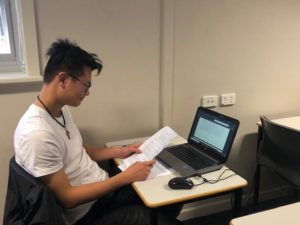Why should I study Psychology?
We often wonder why we think, feel and behave in certain ways.
Knowledge of Psychology helps us to better understand ourselves and our social world. It teaches us how to study behaviour by looking at how our brain processes information and also how our environment influences us.
Psychology fits nicely between the sciences and humanities. There is a little something for everyone; there will be science inquiry, philosophical questions, ethical and social debates, a bit of statistics, and a whole lot of discussion about human behaviour.
If you are interested in learning more about people, and why they behave they way they do, and ways we can manage and change behaviour, join us in Psychology!


Where does Psychology lead?
Psychology is a direct pathway to a career in this field, but this subject is invaluable for more than just becoming a Psychologist. Other possible careers include (and are certainly not limited to): social work, teaching, counselling, sport, media, marketing and the legal system.
Psychology is a large part of many workforces, so it is likely you might find some psychology in any of the future careers you choose to pursue. Studying Psychology at university can be as a degree (eg Bachelor of Psychology) or as electives in several different humanities based degrees (eg Bachelor of Arts), not just as part of a Psychology degree.
What work will I do in Psychology?
In Stage 1, the topics are:
- Neuropsychology
- Psychological Wellbeing
- Intelligence
- Cognitive Psychology
- Forensic Psychology
- Sports Psychology
- Human Psychological Development
- Emotion
Core Principals
- Science Inquiry Skills
- Science as a Human Endeavour
In each 10 credit course (Psychology A or Psychology B), three of these topics are studied.
In Stage 2, the topics are:
- Psychology of the Individual
- Psychological Health and Wellbeing
- Organisational Psychology
- Social Influence (Examinable)
- The Learning of Psychology (Examinable)
Core Principals
- Science Inquiry Skills
- Science as a Human Endeavour
Assignments are a combination of investigation reports, responding to scenarios, science as a human endeavour inquiry, and test style questions and responses.
What do other students think about Psychology?
Personally, I am really interested in the forensic field. Many of the topics can be connected to your own interests, allowing you to centre your assignments around things you’re interested in. Being given the opportunity to research into forensics more has expanded my knowledge and allowed me to research more deeply into the forensic industry.
Imogen
It’s fascinating to see how mental illness can impact lives and how people learn to manage it. As someone aiming to becoming a Psychologist, I think the most important information we’ve learned is how the brain itself works and develops. This is knowledge we can use in many aspects of our lives; relationships, careers, research, even child-raising if that’s something we want. It’s always good to know more about how you function. Psychology courses are very unique in that they allow you to understand other people’s feelings more precisely. You can come to understand why people react the way they do and why they say the things they say. I think, to some degree, studying Psychology can make you more empathetic.
Amber
Where can I find more information about Psychology?
For more detail about content and assessment, view the course information:
- Stage 1 (Year 11)
- Stage 2 (Year 12)
